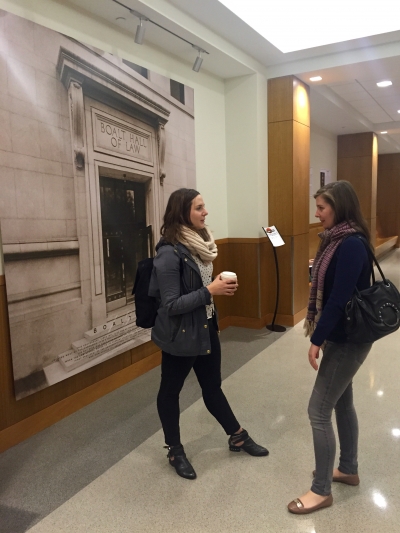
Berkeley Law students meeting after class.
UC Law School Announces Free Tuition for Native American Students
The University of California at Berkeley School of Law is covering tuition costs for in-state Native American students this fall.
Berkeley Law announced last week that it will cover professional degree supplemental tuition (PDST) for qualifying students. PDST makes up the bulk of law students’ costs at $21,334 per semester for in-state residents, on top of the $5,721 tuition per semester.
MAKING LAW EDUCATION MORE ACCESSIBLE
The law school announcement follows plans by the University of California system to cover tuition and student services fees for in-state residents who are members of federally recognized tribes.
“We agreed with the University Office of the President that it’s important to make this education accessible, but we also immediately recognized that PDST would remain a significant impediment. Doing nothing to address this reality wouldn’t be in keeping with the spirit of the Native American Opportunity Plan,” Berkeley Law Dean of Admissions and Financial Aid Kristin Theis-Alvarez says. “We felt the only way to honor the intention was for Berkeley Law to also offset PDST.”
The financial aid will be available to both new students and continuing students who qualify this fall. Erwin Chemerinsky, Dean of the UC Berkeley School of Law, approved of the plans to cover fees for qualifying students with existing financial aid money.
“Native Americans are very underrepresented in law schools and the legal profession. It is very important for Berkeley Law to provide opportunities for Native American students,” Chemerinsky says. “This also is part of an important, larger effort to create a top program in Indian Law at Berkeley Law.”
The University of California at Los Angeles School of Law already has an existing program that provides full-tuition scholarships and living expenses to students who are members of federally recognized tribes or future tribal advocates. Both the University of California at Davis School of Law and the University of California’s Hastings College of the Law in San Francisco tell the ABA Journal that similar plans are in the works.
Sources: Berkeley Law, ABA Journal

Questions about this article? Email us or leave a comment below.